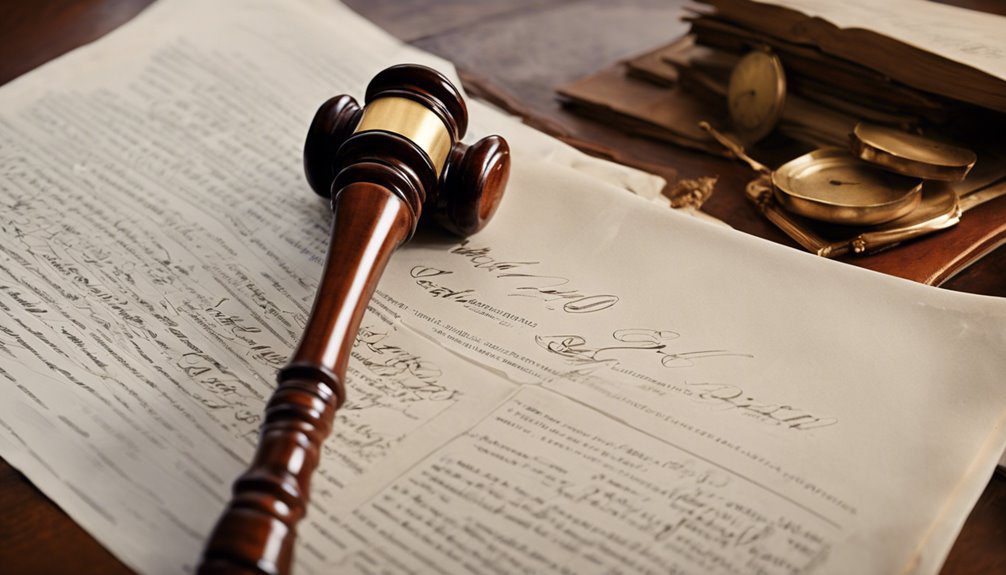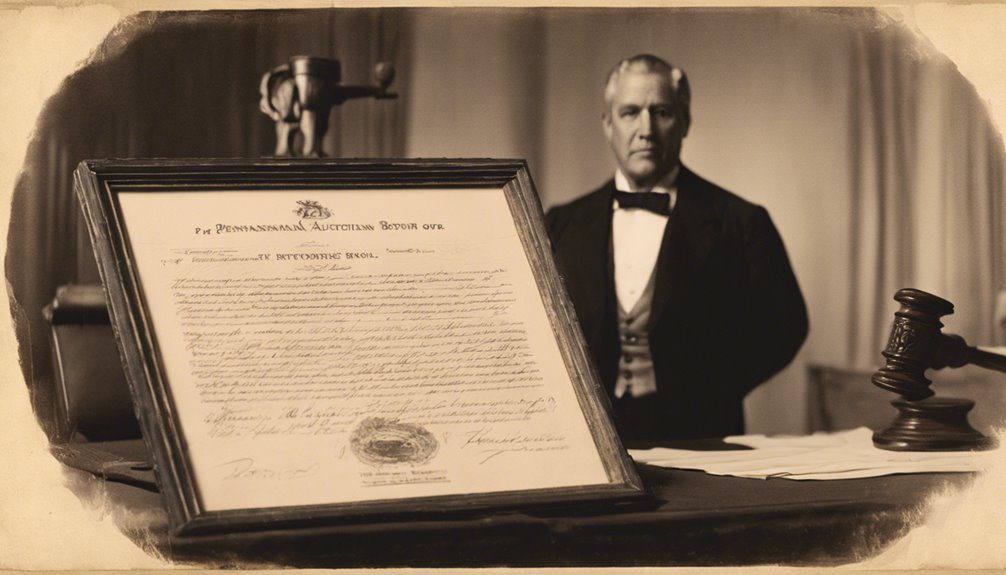When you're navigating the auctioneer landscape in Pennsylvania, understanding the significance of the auctioneer bond is vital. This bond serves not just as a legal requirement but as a cornerstone for building trust with your clients. Without it, you might face challenges that could jeopardize your reputation and business. You'll want to explore how the bond amount, compliance, and overall costs can impact your operations. What happens if you fall short of these requirements? The implications might be more serious than you think.
Understanding Auctioneer Bonds

Understanding auctioneer bonds is crucial if you're planning to operate as an auctioneer in Pennsylvania. These bonds serve as a financial guarantee that you'll adhere to state laws and regulations while conducting auctions. Essentially, they protect consumers from potential fraud or unethical practices by ensuring you fulfill your obligations.
When you apply for an auctioneer bond, you're required to provide certain information, including your business details and financial history. The bond amount can vary, but it typically reflects the level of business you'll conduct.
It's important to know that obtaining a bond isn't just a formality; it's a legal requirement in Pennsylvania. If you fail to comply with the terms of the bond, it can lead to claims against it, which could result in financial liability for you. Furthermore, understanding the costs and premiums associated with auctioneer bonds can help you budget effectively for this essential requirement.
By understanding the requirements and responsibilities tied to auctioneer bonds, you position yourself for success in your auctioning endeavors. Moreover, working with a reliable bonding company can simplify the process, ensuring you meet all necessary standards.
Importance of Auctioneer Bonds
Auctioneer bonds play a vital role in establishing trust between you and your clients. When you hold an auction, you're not just selling items; you're managing your clients' valuable assets.
An auctioneer bond ensures that you adhere to ethical practices and regulations, which instills confidence in your clients. They want to know their interests are protected and that you're operating fairly.
By having a bond, you signal to potential bidders and sellers that you're a legitimate and trustworthy professional. If any issues arise, such as mismanagement of funds or failure to deliver promised services, clients can file a claim against your bond. This safety net reassures them that they can seek compensation, should things go wrong.
Moreover, a strong bond can enhance your reputation in the industry. It demonstrates your commitment to integrity and professionalism, making it easier for you to attract more clients and secure profitable contracts.
In a competitive market, showcasing your bond can set you apart from others who may not prioritize such accountability. Ultimately, an auctioneer bond isn't just a requirement; it's a vital element of your business strategy that fosters trust and reliability. Additionally, it serves as a form of financial security that protects against potential losses due to non-compliance or unethical behavior.
Legal Requirements in Pennsylvania

In Pennsylvania, obtaining an auctioneer bond is essential for anyone looking to operate legally in the auction industry. This bond serves as a financial guarantee that you'll adhere to state laws and regulations governing auctions. It protects your clients by ensuring they'll be compensated in case of any misconduct or fraud on your part.
To get started, you'll need to apply for a license through the Pennsylvania Department of State. This process typically involves submitting an application, providing proof of your bond, and paying any associated fees.
You'll also need to meet certain qualifications, such as being at least 18 years old and having a high school diploma or equivalent.
In addition to the bond, you're required to complete a specific number of continuing education hours to maintain your license. This ensures you stay updated on the latest laws and best practices in the auction industry.
Types of Auctioneer Bonds
When entering the auction industry, it's crucial to know that there are different types of auctioneer bonds available to suit your specific needs.
The most common type is the general auctioneer bond, which protects buyers from any fraudulent activities or misrepresentations made by the auctioneer. This bond ensures that you operate within legal and ethical standards, providing peace of mind to both sellers and bidders.
Another type is the specific auction bond, which may be required for particular events or types of auctions, like real estate or vehicle auctions. This bond guarantees compliance with state regulations and protects the interests of participants in those specific transactions.
You might also encounter a seller's bond, which is useful if you're auctioning items on behalf of someone else. It ensures that you'll handle the seller's proceeds appropriately and fulfill your obligations.
If you're considering starting an auction house or working as an auctioneer, it's essential to evaluate your situation and determine which bond fits your business model.
Understanding these options can help you make informed decisions and ensure compliance with Pennsylvania's auctioneering laws.
Bond Amounts and Limits

How much coverage do you need for your auctioneer bond? In Pennsylvania, the required bond amount typically ranges from $10,000 to $20,000, depending on your specific auctioneer license and business activities. This bond serves as a financial guarantee that you'll adhere to state regulations and fulfill your obligations to clients and customers.
Keep in mind that while the minimum bond amount is set by law, securing a higher amount can enhance your credibility and provide additional protection for your clients. If you're dealing with higher-value auctions or expect to handle significant transactions, you might want to consider a larger bond.
Also, remember that the bond amount can influence your premium. Generally, the higher the bond amount, the more you'll pay in premiums. Insurance companies assess various factors, including your credit score and business history, when determining your rates.
It's crucial to shop around and compare quotes from different surety bond providers to find the best deal for your needs. Additionally, specific bonds may be mandated by local regulations, which can affect the required amount.
Ultimately, choosing the right bond amount not only meets legal requirements but also protects your reputation and instills confidence in your clients.
How to Obtain a Bond
Securing an auctioneer bond in Pennsylvania involves a straightforward process. First, you'll need to determine the specific bond amount required for your auctioneering activities. Once you know this, you can start looking for a surety bond provider. It's best to compare different companies to find one that fits your needs.
Next, gather the necessary documentation. This typically includes your business details, a completed bond application, and any financial statements that may be requested. You might also need to provide personal information, such as your credit score and identification.
After submitting your application, the surety company will evaluate your financial stability and risk profile. They may ask for additional information, so be prepared to respond promptly.
Once approved, you'll receive a quote for the bond. If you agree to the terms, you'll need to pay the premium, which will allow you to obtain the bond. It's essential to understand the user-friendly resources available to help you navigate the bonding process effectively.
Costs Associated With Bonds

Understanding the costs associated with obtaining an auctioneer bond in Pennsylvania is essential for budgeting your business expenses. The primary cost you'll encounter is the premium, which typically ranges from 1% to 10% of the bond amount. This percentage depends on factors like your credit score, business history, and financial stability. If you have a strong credit profile, you might pay closer to the lower end of that range.
You should also consider the bond amount required by the state. For Pennsylvania auctioneers, this amount is usually set at $20,000. Therefore, if your premium is 2%, you'd pay $400 annually.
In addition to the premium, some surety companies may charge a one-time application fee. It's wise to ask upfront about any hidden fees to avoid surprises later. Additionally, the performance bond process involves a credit check, which can influence your premium rate.
Lastly, remember that bond costs can fluctuate based on market conditions and your personal financial situation, so it's a good idea to shop around for the best rates. By understanding these costs, you can make informed decisions that align with your financial strategy.
Maintaining Your Bond
To keep your auctioneer bond in good standing, it's crucial to stay on top of your obligations and renewals. You'll need to familiarize yourself with the specific requirements set by the state of Pennsylvania, as these can vary.
Make sure you understand the annual renewal process and any associated fees. Set reminders for yourself well in advance of your renewal date to avoid any lapses.
Additionally, maintaining a good reputation is vital. Always conduct your auction activities in compliance with local laws and regulations. This not only protects your bond but also builds trust with your clients and ensures repeat business.
If you encounter any issues or complaints, address them promptly. Ignoring problems can lead to claims against your bond, which could jeopardize your status.
Keep accurate records of all transactions and communications related to your auctions. This documentation can be invaluable if you need to defend yourself against a claim.
Lastly, consider consulting with your bonding company periodically. They can provide insights on best practices and help you stay compliant with evolving regulations.
Common Bonding Issues

Many auctioneers run into common bonding issues that can jeopardize their operations. One of the most frequent problems is failing to renew your bond on time. This oversight can lead to gaps in coverage, leaving you vulnerable to penalties and loss of credibility.
It's crucial to keep track of renewal dates and ensure all paperwork is submitted promptly.
Another issue isn't understanding the bond's coverage limits. Many auctioneers mistakenly assume their bond protects against all potential liabilities. However, specific exclusions may apply, and you could find yourself financially liable if a situation arises outside your bond's scope.
Additionally, poor credit history can impact your bonding process. If you've had financial difficulties, securing a bond might become more challenging or costly. To avoid this, maintain a solid financial record and work on improving your credit score.
Lastly, miscommunication with the bonding company can lead to misunderstandings about your obligations or coverage. Always clarify any doubts and keep open lines of communication to ensure you fully understand the terms of your bond.
Addressing these common issues proactively can help you maintain a smooth operation in your auctioneering business. Furthermore, it's important to note that debt consolidator bonds play a critical role in protecting both consumers and service providers in financial transactions.
Resources for Auctioneers
While navigating the complexities of the auctioneer business, having access to the right resources can make all the difference. First, consider joining professional organizations like the National Auctioneers Association (NAA). They offer valuable training, networking opportunities, and updates on industry standards that can enhance your knowledge and credibility.
Next, leverage online platforms and forums tailored for auctioneers. Websites like AuctionZip and Proxibid provide tools for listing auctions, reaching broader audiences, and learning from fellow auctioneers.
Don't underestimate the power of social media. Engaging with potential clients and showcasing your auctions on platforms like Facebook and Instagram can significantly boost your visibility.
Additionally, familiarize yourself with state regulations and licensing requirements. The Pennsylvania Department of State's website offers comprehensive information about auctioneer bonds and legal obligations.
Lastly, consider investing in technology that streamlines your operations, such as auction management software. These tools can help you manage inventory, track bids, and handle payments efficiently.
Conclusion
In conclusion, securing a Pennsylvania auctioneer bond is essential for your success in the auction industry. It not only ensures compliance with state laws but also protects your clients and enhances your credibility. By understanding the requirements and maintaining your bond, you can avoid common issues and build trust with your customers. Remember, staying informed and compliant will set you apart in a competitive market, allowing your auction business to thrive.


